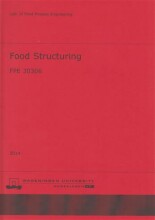Flavor release - Flavor binding - Polysaccharide-flavor interactions
3 important questions on Flavor release - Flavor binding - Polysaccharide-flavor interactions
Does the interaction of flavours and polysaccharides enhance or decrease the release of flavour molecules?
- Sugars added in high concentrations --> salting-out effect --> sugars interact with the water molecules --> increasing the concentration of the flavour molecules --> increase the flavour concentration in the gas phase --> better flavour uptake
- Low concentration of sugar --> increase or decrease the release depending on the interaction with the flavours
How can polysaccharides/sugars be bound to flavours?
- The side chains of polysaccharides contain ionizable groups, they can undergo ionic bindings.
- Hydrogen bonding
How do flavours bind to amylose?
- Helical structure
- Hydrophobic flavour compounds are trapped inside the helix and form a complex --> inclusion complexes
- The sizes of the cores of the helix determines whether the flavour molecules will be trapped
- Amylose can take up alcohols, aldehydes, ketones and fatty acids
The question on the page originate from the summary of the following study material:
- A unique study and practice tool
- Never study anything twice again
- Get the grades you hope for
- 100% sure, 100% understanding




























